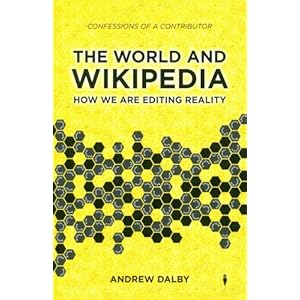
Being an infrequent user of Wikipedia, I could not really relate to Dalby's second half of the book as he primarily supported his reasoning through real-life Wikipedians' stories that exemplify his points. Indeed, Wiki is a great resource (in my opinion) and is proved to be used constantly despite the questionable content and quality, but I have not come across one person who 'wiki's' everything to get their information. Therefore, I don't fully agree with the beginning second half of "The World and Wikipedia" that starts off with "why we love it."
Do we really love it? Or do we enjoy having it at a couple clicks away? Dalby uses a multiple reasons, some repetitively stated in different examples to explain why we love it. One reason explains the American culture's transformation from living full of paper, to the "virtual nation" (p. 120). Again, here we can mesh in Neil Postman's Technopoly; because we are in a Technopoly and involved in an intense digital nation, we love being anonymous, and therefore, allowing us to edit/post anything we'd like on Wikipedia, it's ultimate freedom-- which brings Dalby to another interesting reason as to why we love Wiki: because "it lets us write about whatever we want...we have all the space we want" (p. 130). This reasoning is what I personally agree with most. Out of curiosity, I Googled every noun on top of my head, Pokemon character (as Dalby said there was a page for every pokemon), and towns across New Jersey, and they all had Wikipedia pages. The Internet has no space limit, and the access to Wikipedia gives us the unlimited freedom to edit and write whatever we want without having it deleted or not published at all. This is ultimately why encyclopedias on library shelves, the cease to using Britannica and Encarta have become obsolete despite Wikipedia's questionable credibility.
On the other hand, I enjoyed portions of the book where I gained some information about Wikipedia. Dalby pops in facts about who manages Wikipedia and how Wikipedia works along each chapter. I always wondered, if Wikipedia is not trusted, why is their relatively strong, well written articles? Surprisingly, Wikipedia have administrators, ones who are constantly on the site maintaining the site. Moreover, there are actually professionals who write a lot of the content on Wikipedia, such as professors, scientists and politicians. Even though a pure amateur can simply edit a Wiki page, there are a selected number of Wiki contributors who are trusted that contribute constantly, and it's not always a random Wiki user providing us with information.
Dalby concludes his well-supported thoughts of Wikipedia reiterating the multiple examples of articles constantly changing that end up spreading invalid information. Again, no matter how invalid the information Wikipedia holds, our society, and particularly this generation want quick, simple information at our fingertips. Wikipedia perfectly fit those needs, and we will always use it as our resource instead of an official encyclopedia. Yet, Dalby questions the future of Wikipedia and how it will effect society. He uses this statement to leave a thought on how we use it: "No one can claim that Wikipedia, as a whole, is a 'reliable source'. Instead, accepting it as not the least reliable of online guides, and drawing thirstily on its footnotes and external links, we - I'm speaking now for myself and all the others, writers and journalists, scholars and scientists, who actually use Wikipedia already - judge each article for reliability on its merits" (p. 220). This statement polished a thought I always had on Wikipedia. That is, Wikipedia can't be trusted for the information it provides, though, it's a great resource to learn the shallow details of your search.
No comments:
Post a Comment